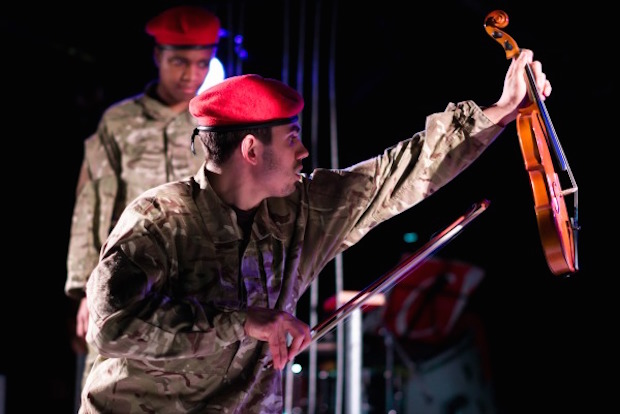Speech Acts
Shadwell Opera, Courtyard Theatre
Election time is upon us again. But before we arrive at the main event there are the warm-up acts – televised debates, broadsheet profiles and daytime television interviews – to be endured. Making this political stand-up more bearable are the intelligent heckles coming from the arts. London’s theatres are filled with issue-plays talking about all the topics the politicians aren’t – the housing crisis, NHS, life on the dole – but despite a rich seam of politically-charged works at its disposal (The Marriage of Figaro, Don Carlo, Boris Godunov among them), the main UK opera houses aren’t following suit. Which makes Speech Acts – a politically-charged double-bill from youthful Shadwell Opera – all the more welcome.
Facing off here are Stravinsky’s folk-parable-fairytale A Soldier’s Tale and George Benjamin’s exquisitely bleak reworking of the Pied Piper legend, Into The Little Hill – neither an explicitly political work, but each dealing in the fundamental, everyday currency of politics: promises, bargains and uneasy alliances.
Stravinsky’s story is a simple one: a deal with the devil, betrayal, cunning, small-print, love, death. What elevates this play-with-music is the endless invention of the scoring (the composer was working, for lack of funds, with just seven players) and the magpie musical styles embraced by a score whose folk elements always come filtered through salon sophistication. Conductor Finnegan Downie Dear deploys his forces with more force than delicacy in the compact space of Hoxton’s Courtyard Theatre, but crucially keeps up the pace of Stravinsky’s sprawling tale.
Director Jack Furness delivers an efficient, sub-Brechtian production with just the right degree of makeshift urgency. The interventions of Kathryn Griffiths’s Narrator are tender and charged, though often her words are lost in a battle with the orchestra, sending the Soldier (Simeon John-Wake) out with never-wearied hope. She meets her match in the explosive dynamism of Terri Wikey’s Devil – a ferocious force in such a confined space. The unattributed English translation is a mistake, however; rhymes are laboured and colloquialisms (“strewth”) distract from the quiet timelessness of the drama.
From words about music to music that takes the place of words in George Benjamin’s Into The Little Hill. When a mysterious stranger with no eyes, no ears and no nose arrives in a town, promising to rid it of some troublesome rats with the aid of his music it seems too good to be true. And it is. Benjamin’s chamber opera, set to a text of architectural simplicity by Martin Crimp, is a masterpiece. Like a late novel by Roth or Coetzee it tells its dark tale with not a note to spare, weaving a story of real allegorical scope from just two singers who both narrate and enact.
Furness and designer Georgia de Gray keep visuals clean and monochrome, wisely not cluttering the clarity of Benjamin’s music with the stage business that dominated the Stravinsky. This allows the extraordinary subtlety of the composer’s instrumental textures to come to the fore, dominated by the eerie delicacy of the cimbalom.
Inhabiting only the extremes of tessitura, Benjamin’s vocal writing demands a high soprano and the lowest of contraltos – a textural disparity that sets each at odds from the very start, with no common musical ground. While Emily Vine’s soprano is diamond-clear, contralto Jess Dandy can’t quite find her footing in Benjamin’s depths, weakening a musical battle of wills that is fought as much in the details of this score as in the drama.
With the major political parties still struggling to produce coherent strategies for the arts, it’s a timely moment to be reminded of the power of music – whether for good or evil. This operatic double-bill is, at heart, a manifesto, a plea for the value of disciplines that not only comment and react, but also shape our society.







Comments